
Imago Temporis-Medium Aevum
Scope & Guideline
Exploring the Depths of Medieval Scholarship
Introduction
Aims and Scopes
- Interdisciplinary Historical Analysis:
The journal publishes research that employs various methodologies, including historical, archaeological, and literary analyses, to examine medieval societies in Europe. - Political and Social Structures:
A significant focus is placed on the political dynamics, power relations, and social structures of medieval communities, particularly in the context of noble and royal interactions. - Cultural and Religious Studies:
The journal explores cultural practices, religious influences, and their impact on medieval identity and societal norms, reflecting on how these elements shaped medieval life. - Regional Studies and Comparative Analyses:
Research often includes specific regional studies within Europe, comparing different areas' historical developments and cultural exchanges during the medieval period. - Publications on Historical Narratives:
The journal emphasizes the role of historiography and the construction of historical narratives, examining how medieval histories have been recorded and interpreted over time.
Trending and Emerging
- Identity Formation and Social Cohesion:
Increasing research on how identity is constructed among various groups in medieval societies, including ethnic, cultural, and social identities, is becoming more prevalent, indicating a shift towards exploring social dynamics. - Political Communication:
There is a growing focus on political communication, particularly how power dynamics are expressed and negotiated among different social classes and political entities in medieval contexts. - Cultural Memory and Collective Narratives:
Emerging studies on collective memory and the ways communities remember and reinterpret their pasts are gaining traction, reflecting a broader interest in historiography and memory studies. - Digital Humanities and Medieval Studies:
The integration of digital tools and methodologies in medieval studies is becoming more common, as scholars seek to utilize technology for research, teaching, and public engagement. - Impact of Religion on Society:
There is an increasing trend toward exploring the complex interplay between religion and societal structures, including how religious beliefs and institutions influenced political and social developments.
Declining or Waning
- Focus on Maritime Activities:
Research related to maritime activities, particularly fishing and maritime law, has seen a reduction in frequency, indicating a possible waning interest in this niche area of medieval studies. - Studies on Feudalism:
While feudalism was once a central theme in medieval studies, the journal's recent publications suggest a decline in this focus, as scholars shift towards more dynamic and less rigid conceptualizations of medieval society. - Traditional Gender Roles:
The exploration of traditional gender roles within medieval societies has become less frequent, possibly overshadowed by a growing interest in more diverse and inclusive perspectives on gender and identity. - Legal History of Minor Jurisdictions:
Research focusing on the legal history of less significant jurisdictions has diminished, with more attention now given to broader trends and more impactful legal frameworks.
Similar Journals

Medievalismo
Fostering Critical Dialogue on Medieval InfluencesMedievalismo is a distinguished academic journal dedicated to the interdisciplinary study of medieval culture, history, and societal influences, published by the esteemed University of Murcia in Spain. Since achieving Open Access in 2010, it has fostered a rich environment for the dissemination of knowledge, encouraging contributions from researchers and scholars across diverse fields. The journal holds a notable Q1 ranking in History and exhibits strong performance metrics in Arts and Humanities and Cultural Studies, as evidenced by its relevant Scopus rankings. With a commitment to promoting high-quality research and discussion, Medievalismo has positioned itself as an essential resource for academics and students aiming to deepen their understanding of the medieval period. Situated in a vibrant scholarly landscape, it continues to publish transformative insights and foster critical dialogue, making significant contributions to the cultural and historical narratives of our time.

Zbornik Radova Vizantoloskog Instituta
Bridging Historical Context with Contemporary PerspectivesZbornik Radova Vizantoloskog Instituta is a distinguished open-access journal published by the Institute of Byzantine Studies, Serbian Academy of Sciences and Arts, located in Belgrade, Serbia. Since its inception in 2003, this journal has served as a vital platform for the dissemination of scholarly research in the fields of Classics, History, Linguistics and Language, and Literature and Literary Theory. Although it currently holds a Q4 ranking in the 2023 category quartiles, its commitment to fostering academic discourse and research accessibility is unwavering. The journal features a diverse range of articles that explore the complexities and nuances of Byzantine studies and related disciplines, catering to a broad audience of researchers, professionals, and students dedicated to the humanities. With a focus on both historical context and contemporary perspectives, Zbornik Radova Vizantoloskog Instituta aims to contribute significant insights into the academic community while promoting scholarly interaction on a global scale.
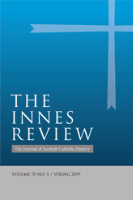
Innes Review
Cultivating critical analyses in the realms of culture and religion.The Innes Review is a distinguished academic journal published by Edinburgh University Press, focusing on the study of culture, history, and religion. With a commitment to advancing scholarly discourse, the journal serves as an essential resource for researchers and professionals alike, providing critical insights and analyses that cater to the diverse interests within Cultural Studies, History, and Religious Studies. Established in 1996 and continuing through 2024, the journal has achieved notable recognition, reflecting its contributions through its Q3 ranking in History and Q4 rankings in Cultural and Religious Studies according to the latest metrics. While it currently operates without an open access model, the Innes Review remains accessible through a variety of academic databases and resources, underpinned by rigorous peer-review processes that ensure high-quality publications. As such, it stands as a vital platform for disseminating innovative research and fostering intellectual engagement within the humanities.
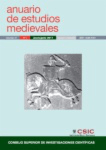
Anuario de Estudios Medievales
Advancing Knowledge in the Realm of the Middle AgesAnuario de Estudios Medievales is an esteemed academic journal dedicated to the field of Medieval Studies, published by the Consejo Superior de Investigaciones Científicas (CSIC) in Spain. With an ISSN of 0066-5061 and an E-ISSN of 1988-4230, the journal has been offering open access to researchers since 1996, fostering a collaborative and inclusive scholarly environment. Recognized for its high impact, it holds a commendable Q1 ranking in History as of 2023, reflecting its influence in the academic community. The journal encompasses a rich array of topics within medieval history, making it a vital resource for historians, scholars, and students alike who seek to explore and understand the complexities of the medieval period. With its indexed presence in Scopus, where it ranks 557th among 1760 in the Arts and Humanities category, Anuario de Estudios Medievales stands as a cornerstone publication, bridging historical inquiry and contemporary research in Medieval Studies.
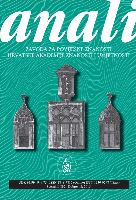
Anali Zavoda za Povijesne Znanosti Hrvatske Akademije Znanosti I Umjetnosti u Dubrovniku
Bridging Cultures Through Scholarly DiscourseAnali Zavoda za Povijesne Znanosti Hrvatske Akademije Znanosti I Umjetnosti u Dubrovniku, an influential academic journal published by the Croatian Academy of Sciences and Arts, Institute of Historical Sciences in Dubrovnik, serves as a significant platform for research and discourse within the fields of history, archaeology, literature, and cultural studies. Since its transition to Open Access in 1999, the journal has broadened its reach, making scholarly content accessible to a global audience. As a result of its commitment to quality and rigor, it has achieved respectable rankings across various disciplines — notably, a Q3 in Literature and Literary Theory and Q4 in several other categories in the 2023 evaluations. Located in the picturesque city of Dubrovnik, this journal not only highlights the rich historical narrative of Croatia but also contributes to international dialogues on related subjects. Researchers, professionals, and students will find invaluable insights and contemporary discussions in its pages, offering a unique perspective on the intersections of history, culture, and the arts.
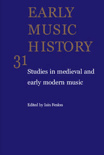
EARLY MUSIC HISTORY
Celebrating the Rich Tapestry of Musical HistoryEARLY MUSIC HISTORY is an esteemed academic journal published by Cambridge University Press, specializing in the rich and diverse field of early music, providing a vital platform for research and discourse since its inception. With an ISSN of 0261-1279 and an E-ISSN of 1474-0559, the journal operates from its headquarters in Cambridge, United Kingdom. Known for its scholarly rigor, EARLY MUSIC HISTORY is ranked within the Q2 category in Music, illustrating its significant contribution to the field. The journal covers a broad time frame, examining musical developments from the medieval to the early modern period, and features articles that seek to illuminate historical contexts and contemporary implications of early music practices. Despite lacking the Open Access option, it remains a valued resource for researchers and professionals seeking to advance their understanding of this dynamic area of study. The journal not only fosters a deeper appreciation of early music history but also positions itself as a pivotal contributor to ongoing academic dialogue, making it essential reading for scholars in the arts and humanities.
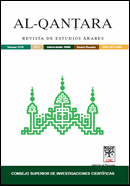
AL-QANTARA
Advancing Scholarly Dialogue Across Cultures and Eras.AL-QANTARA, published by the Consejo Superior Investigaciones Cientificas (CSIC), is a prestigious academic journal that has been at the forefront of interdisciplinary research in the fields of Cultural Studies, History, and Literature and Literary Theory since its inception in 1984. Renowned for its commitment to open access since 1996, the journal promotes a comprehensive understanding of the interconnectedness of cultural narratives and historical discourse, making it an invaluable resource for researchers and students alike. With impressive rankings in Scopus—including a top placement in the Q1 category for Literature and Literary Theory and Q2 in both Cultural Studies and History—AL-QANTARA effectively bridges theoretical insights with empirical research, contributing to robust academic dialogue and innovation. Operating out of Madrid, Spain, it stands as a pillar of scholarly excellence, offering a platform for diverse voices in the humanities to share their findings and engage with critical contemporary issues.
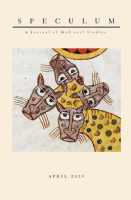
SPECULUM-A JOURNAL OF MEDIEVAL STUDIES
Illuminating the Medieval ExperienceSPECULUM: A Journal of Medieval Studies, published by University of Chicago Press, stands as a premier academic platform within the field of medieval studies. With an impressive legacy dating back to its inception in 1926, this journal has attracted scholarly contributions that explore the rich tapestry of human experience during the medieval period, encompassing areas such as history, literature, philosophy, cultural studies, and the visual and performing arts. It boasts elite rankings—Q1 in History, Literature and Literary Theory, Religious Studies, and Visual Arts and Performing Arts, with a commendable Q2 in Cultural Studies and Philosophy—attesting to its impact and relevance in academia. Although it is not an open-access journal, the rigorous peer-review process and critical scholarship found within its pages provide invaluable insights for researchers, professionals, and students alike. With a substantial Scopus ranking, ID 0038-7134, and E-ISSN 2040-8072, SPECULUM continues to serve as an essential resource for advancing knowledge and understanding of the medieval world, encouraging interdisciplinary dialogue and scholarly interaction.

STUDI MEDIEVALI
Uncovering the Rich Tapestry of the Medieval EraSTUDI MEDIEVALI, published by the Centro Ital Stud Sull Alto Med, is a premier journal dedicated to the exploration of medieval studies, focusing on both cultural and historical dimensions. Since its inception in 2002, this journal has become an essential resource for scholars and students alike, providing critical insights into the complexities of the medieval era. Although it currently operates under a traditional access model, its contributions to the field are undeniable, with a 2023 ranking in the fourth quartile for Cultural Studies and History categories in Scopus rankings, highlighting its niche yet valuable position within academic discourse. Based in Spoleto, Italy, the journal serves as a platform for innovative research and interdisciplinary dialogue, inviting contributions that challenge conventional understandings and stimulate further inquiry into medieval life. Researchers and professionals will find in STUDI MEDIEVALI an opportunity to engage with a community of passionate scholars dedicated to uncovering the multifaceted realities of the medieval period.

Micrologus-Nature Science and Medieval Societies
Connecting Past Insights to Modern Scientific DiscourseMicrologus-Nature Science and Medieval Societies, published by SISMEL EDIZIONI GALLUZZO, is an essential scholarly journal that delves into the intricate relationships between nature, science, and medieval societies. With the ISSN 1123-2560 and an E-ISSN of 1123-2560, this journal caters to a diverse academic community interested in the historical intersections of science, philosophy, and culture from the medieval era. Spanning its publication years from 2015 to 2018 and continuing through 2020 to 2024, it has established itself within important academic categories, notably garnering a Q3 ranking in History and a Q4 in History and Philosophy of Science for 2023. Despite being in the lower quartiles of Scopus rankings, the journal plays a crucial role in promoting dialogue and research among scholars focusing on the medieval period's influence on contemporary scientific thought. Researchers, educators, and students are encouraged to explore its articles, which aim to illuminate the complexities of knowledge and culture during one of history's most transformative eras.